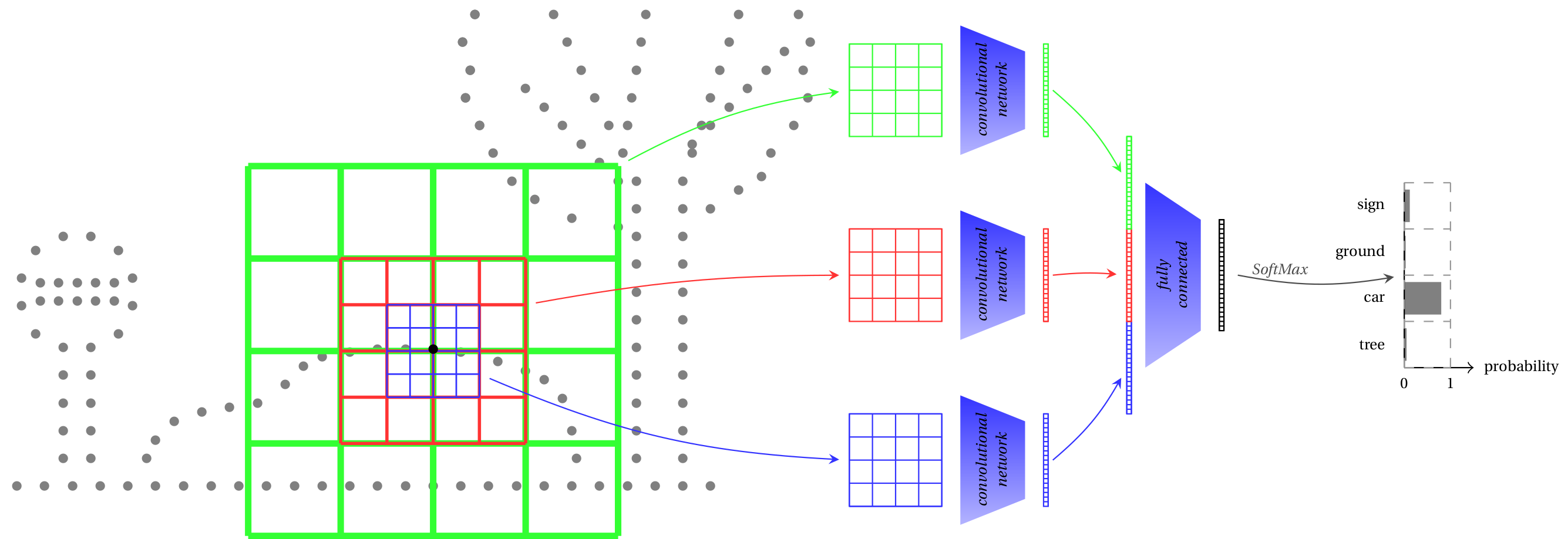Created by Xavier Roynard from NPM3D team of Centre for Robotics of Mines ParisTech.
This work is based on our arXiv paper, which were also presented in IROS 2018 workshop PPNIV'18 and can be found here. We proposed a multiscale convolutionnal network architecture for semantic segmentation of 3D point cloud scenes.
Point cloud is an important type of geometric data structure. Due to its irregular format, we transform such data to regular 3D voxel grids. This, however, renders data voluminous and avoids using high resolution grids, which forces to make a compromise between a low discretization step (allowing a better local representation of the surface) and a grid that represents a large volume (allowing a better understanding of the context).
In this paper, we use a multi-scale input to handle this problem. Our network, named MultiScaleN_DeepVoxScene (abbreviated in MSN_DVS, N is the nuber of scales used), provides an architecture that allows a precise representation of the surface near a point and the more distant context around a point. Though simple, the use of several scales greatly improves classification results.
In this repository, we release code for training a multiscale classification 3D convolutionnal network on fully annotated point cloud scenes.
If you find our work useful please cite one the following articles :
@inproceedings{roynard2018classificationIROS,
title={Classification of Point Cloud for Road Scene Understanding with Multiscale Voxel Deep Network},
author={Roynard, Xavier and Deschaud, Jean-Emmanuel and Goulette, Fran{\c{c}}ois},
booktitle = {10th Workshop on Planning, Perception and Navigation for Intelligent Vehicles, PPNIV'18},
year={2018},
month={October},
}
or
@article{roynard2018classification,
title={Classification of Point Cloud Scenes with Multiscale Voxel Deep Network},
author={{Roynard}, {Xavier} and {Deschaud}, {Jean-Emmanuel} and {Goulette}, {François}},
journal={arXiv preprint arXiv:1804.03583},
year={2018},
month={April},
}
Tested on Ubuntu 16.04 and Windows 10 with pytorch 1.0, but should also work with pytorch 0.4 and Ubuntu 18.04
python >= 3.5andnumpy >= 1.13pytorch, find installation instructions on https://pytorch.org/scikit-learnplyfileto read point clouds as.plyfilespyyamlto read config files as.yamlfiles
To install scikit-learn, plyfile and pyyaml, you can use:
sudo pip3 install sklearn plyfile pyyaml
To install (it won't download the datasets), just use:
git clone https://github.com/xroynard/ms_deepvoxscene.git
If you also want to download the pre-processed datasets use instead (Warning: datasets may take a lot of space, see below):
git clone --recursive https://github.com/xroynard/ms_deepvoxscene.git
Size of datasets:
- Paris-Lille-3D: takes 5.7 GB on disk
- Semantic3D reduced-8 benchmark: takes 5.2 GB on disk
- S3DIS: takes 5.8 GB on disk
If you already cloned the repository you can either download all datasets with:
cd ms_deepvoxscene
git submodule update --init --recursive
Or download a specific datasets with (use parislille3d, semantic3d or s3dis as <dataset_name>):
cd ms_deepvoxscene
git submodule update --init data/<dataset_name>
This repository has the following arborescence:
ms_deepvoxscene ─┬─ apps ─┬─ test.py # scripts for different tasks
│ ├─ train.py
│ └─ visualize.py
├─ config ─┬─ train_config.yaml # config files
│ ├─ test_config.yaml
│ ├─ debug_config.yaml
│ └─ article_configs ─┬─ train_voxnet.yaml # config files used in article
│ ├─ train_ms1_dvs.yaml
│ └─ train_ms3_dvs.yaml
├─ data ─┬─ parislille3d ─┬─ train # point cloud datasets
│ │ └─ test
│ ├─ semantic3d ─┬─ train
│ │ └─ test
│ └─ s3dis ─┬─ train
│ └─ test
├─ input ─── input.py # class PointCloudDataset
├─ models ─┬─ multiscale_models.py # multiscale models
│ └─ conv_base ─┬─ voxel_models_base.py
│ └─ basic_blocks ─── voxel_blocks.py
├─ runs # will be created when you run some scripts
├─ tests ─┬─ test_input.py # unit tests
│ ├─ test_model_bases.py
│ ├─ test_multiscale_models.py
│ ├─ test_trainer.py
│ └─ test_voxel_blocks.py
└─ utils ─┬─ logger.py # utils
├─ parameters.py
├─ ply_utils.py
├─ tester.py
└─ trainer.py
To train a network:
cd apps
python3 train.py
You can change parameters in file config/train_config.yaml or use your own config file in YAML format with:
python3 train.py --config <your_config_file>
The script writes all logging informations and saves trained models in runs/train_<model_name>_<unique_id>/.
You can check evolution of accuracy and loss during training with:
cd apps
python3 visualize.py ../runs/<log_repo>/
To reproduce article results train a network with one of the config files in config/article_configs/, for exemple to train VoxNet:
cd apps
python3 train.py --config ../config/article_configs/train_voxnet.yaml
To test a network:
cd apps
python3 test.py ../runs/<log_repo>/<trained_model>.tar
You can change parameters in file config/test_config.yaml.
This class takes à .ply file containing a non-subsampled point cloud and looks for all subsampled point clouds in directories sub_*cm lying in the same directory. If there is none, no worries, it will query neighborhoods in the full non-subsampled point cloud (but it might be very time-consuming for big neighborhoods or very dense point clouds).
See input/input.py for more details.
The class ConcatenateDataset of pytorch is then used to iterate over all scenes of a same dataset.
This class takes a class defining a convolutionnal head (without linear layers and softmax) and a class defining the classification part (only the final linear layers and softmax) and a few parameters such as the number of scales to build a multiscale network.
See models/multiscale_models.py for more details.
If you don't download the provided datasets in submodules, you should put the datasets in a directory data with arborescence:
data ─┬─ parislille3d ─┬─ train
│ └─ test
├─ semantic3d ─┬─ train
│ └─ test
└─ s3dis ─┬─ train
└─ test
each directory train or test should contain point clouds in .ply files and subdirectories named sub_<subsampling_distance>cm/ where <subsampling_distance> is an int or a float and the subdirectory contains subsampled versions of point clouds.
Our code is released under MIT License (see LICENSE file for details).
- 26/06/2019: Initial Release
- more unit tests.
- improve visualization of training.
- try segmentation networks (like U-Net).
- add option for non-isotropic occupancy grid and voxels
- add a script
utils/make_submission_file.pythat creates the files to be submitted on the Semantic3D and Paris-Lille-3D benchmarks.
